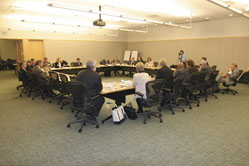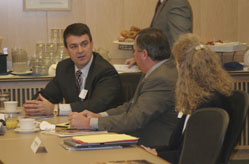
The cost-scarcity issue, however, played out in different ways for each participant in the assembly, depending on an institution’s relationship to available resources. Some at the table were distributors of philanthropic dollars. Some were recipients of the same. Some were both.
For funders, like Larry Jacob of the Greater Kansas City Community Foundation, the issue was not just “providing enough resources for non-profits” and supporting the non-profits in their work, but also of making sure that the recipients had the “capacity” to maximize those resources.
Brenda Sharpe of the REACH Healthcare Foundation put the burden on the funders “to leverage all available resources” with the goal being “to create or strengthen a fragile safety net for the indigent, uninsured and underinsured.” Said Sharpe, “We have it all here. We just need to deploy.”
Jeff Ellis, a veteran health care attorney with Lathrop & Gage, recognized the demands of scarcity both from the perspective of the donor and the recipient. On the one hand, he saw the need for a “metro-wide coordination of our philanthropic efforts” among the funders and for the development of “professional governance” among those funded.
One way to leverage scarce resources, argued Steve Roling of the Health Care Foundation of Greater Kansas City “is to continue to tell the story of the need to increase the access to quality health care for the indigent and the poor.” Tom Dugard of the United Way worried that there were fewer people to tell the story to, given the diminishing base of the kind of large employers that traditionally support his organization and other charities.
J.E. Dunn is the kind of traditional employer that has kept the United Way and like entities vibrant. The Dunn Family Foundation currently supports some 400 local charities, many of them health care related. “Having the resources to continue to support them is very challenging,” Bob Dunn observed. Dunn sees the challenge as one worth under-taking given the “significant breakthroughs” in the last generation, one of which has allowed his father, Bill Dunn, to live long and prosper.
The scarcity of resources worried the potential recipients of those funds even more than it does the donors. Terry Snapp of the Truman Medical Center Charitable Foundation sees a critical need for institutions like his own to work harder at “attracting philanthropy dollars to offset an accelerating drop in revenue that traditionally supports public hospitals”
 Bob Dunn of the Dunn Family Foundation discusses the challenges associated with addressing a growing number of not-for-profit requests.
Bob Dunn of the Dunn Family Foundation discusses the challenges associated with addressing a growing number of not-for-profit requests.Nor does scarcity of resources only affect public hospitals. Mark McPhee, M.D. of Saint Luke’s Hospital saw a need for a dialogue on “the role of philanthropy in helping us support the mission,” that mission being the care of the uninsured and underinsured in Kansas City. A related challenge for the hospital’s foundation, given that Saint Luke’s has not left for the suburbs, is finding the capital to “reinvent the hospital” in its current central city location.
All of this would be difficult enough were decisions being made in a stable environment, but as Bill Bruning of the Mid-America Coalition on Healthcare observed, constant change “makes it difficult to stay on top of the situation for more than a few weeks at a time.”
Less of a challenge than the outside observer might have anticipated was that posed by Katrina and other natural disasters and the effect of those on existing resources.
As Steve Roling noted, his board puts money aside for emergencies, and these were the kind of emergencies that demanded a quick response. “When disaster hits,” added Bob Dunn, we all wanted to help.” The anticipated fall-off in giving does not seem to have occurred, at least not in Kansas City.
As part of the program, in fact, Mike Tarry of the American Red Cross presented an award to Julie Welch of Meara King & Co. and Joe Sweeney of Ingram’s Magazine for the efforts of their two companies in coordinating a successful fund-raising effort to help the Red Cross deal with emergency needs in Katrina’s wake.